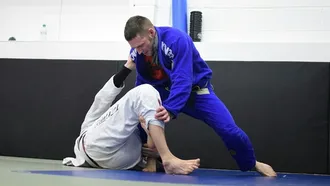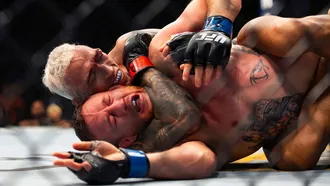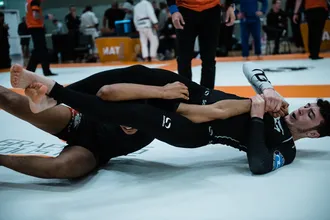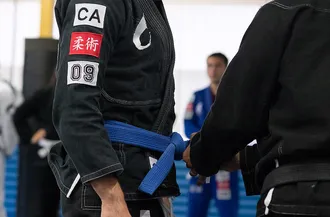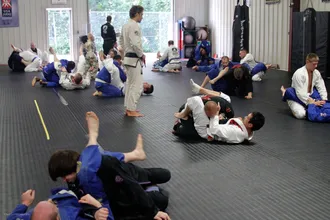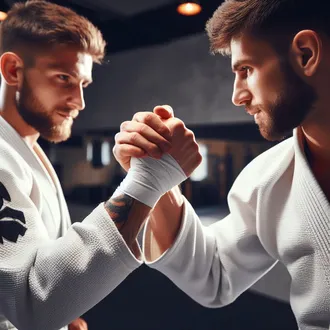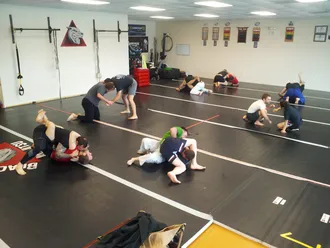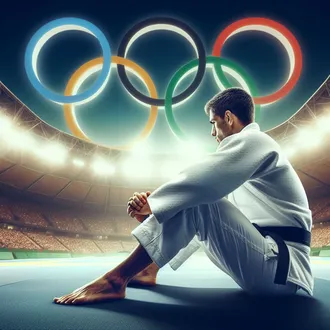
As Brazilian Jiu-Jitsu (BJJ) continues to grow in popularity worldwide, a common question often arises: “Is BJJ an Olympic sport?”
Despite its massive global following and established competition scene, BJJ has yet to secure a spot in the Olympic Games. This article explores the current status of BJJ's Olympic recognition, the strict criteria set by the International Olympic Committee (IOC), and what it would take for BJJ to earn a place among Olympic martial arts.
The Current Status of BJJ in the Olympics
As of 2025, Brazilian Jiu-Jitsu is not an official Olympic sport. Despite its rapidly growing global presence and established competitive circuit, the IOC has not yet granted BJJ Olympic recognition.
Many in the martial arts community, particularly within the BJJ and grappling scene, express frustration over this exclusion. With other martial arts like Judo and Taekwondo having long been Olympic sports, the question remains—what is preventing BJJ from joining them?
Understanding the Olympic Sport Criteria
The IOC has strict requirements for sports seeking Olympic inclusion. To be considered, a sport must demonstrate its global reach, historical significance, governance structure, and alignment with Olympic values.
Some of the key factors include:
- History and tradition
- Universality (global reach)
- Popularity and spectator appeal
- Image and governance
- Health and safety of athletes
- Alignment with Olympic values
BJJ's standing against these criteria presents a mixed picture, with some strengths and key areas for improvement. Let's break it down:
History and Tradition
BJJ has a rich history, evolving from Judo and Japanese Jujutsu in the early 20th century. While its roots run deep, the sport itself is relatively young compared to other Olympic martial arts.
Judo, which was introduced in the 1964 Tokyo Olympics, set a precedent for grappling-based martial arts on the Olympic stage. While BJJ shares a similar foundation, it must establish itself as distinct enough from Judo to justify its separate inclusion.
Universality
The IOC requires a sport to be practiced in at least 75 countries across four continents to be considered for the Olympics. BJJ has experienced significant global expansion, with a growing presence in North and South America, Europe, Asia, and Australia.
However, the challenge lies in ensuring that BJJ meets these universality standards at an institutional level. Unlike Judo or Taekwondo, which are fully integrated into national sports federations worldwide, BJJ is still developing its international infrastructure.
Popularity
BJJ’s popularity has skyrocketed, expanding rapidly across North and South America, Europe, Asia, and Australia.
Major international events like the ADCC (Abu Dhabi Combat Club), Craig Jones Invitational (CJI), and the IBJJF World Championships have elevated BJJ’s visibility. These tournaments attract global audiences and showcase the sport’s technical depth, proving that BJJ has a strong foundation for Olympic-level competition.
To improve its chances of Olympic recognition, BJJ may need to introduce rule modifications that enhance spectator engagement, making matches more exciting and accessible to a wider audience.
Image and Governance
One of the biggest obstacles to BJJ’s Olympic inclusion is governance. Unlike Judo, which has the International Judo Federation (IJF), BJJ lacks a single, universally recognized governing body.
While organizations like the International Brazilian Jiu-Jitsu Federation (IBJJF) have played a significant role in standardizing competition rules, multiple federations still exist, each with its own variations. This fragmentation creates inconsistencies in rules and ranking structures, making it difficult for the IOC to approve a standardized format for Olympic-level competition.
For BJJ to be considered for the Olympics, the sport must establish a centralized international federation that unifies its competition rules and regulatory structure.
Athletes' Health and Olympic Values
The IOC prioritizes athlete safety when considering new sports for the Olympic Games. While BJJ is a physically demanding sport, it is generally safer than striking-based martial arts like Boxing, Taekwondo, and Karate.
BJJ emphasizes grappling and submissions rather than direct strikes, reducing the risk of concussions and brain trauma. However, the sport still carries risks, particularly involving joint locks, ligament injuries, and muscle strains. The IOC would likely require additional safety protocols and medical oversight for Olympic-level BJJ competition.
Beyond safety, BJJ aligns well with Olympic values such as discipline, respect, and sportsmanship. Its structured belt ranking system encourages long-term development, and its competitive culture fosters mutual respect among athletes.
By promoting these values and ensuring strict safety measures, BJJ can strengthen its case for Olympic recognition.
Comparisons with Other Martial Arts in the Olympics: A Journey Through Time
To understand why BJJ is not an Olympic sport yet, it helps to compare its journey with other martial arts that have already been included in the Olympics. Combat sports such as Judo, Taekwondo, and Karate all followed unique paths to Olympic recognition, each overcoming different challenges.
While BJJ shares similarities with these martial arts, it has yet to meet certain Olympic requirements, particularly in terms of governance and spectator engagement. Examining the history of Judo, Taekwondo, and Karate in the Olympics provides insight into what BJJ needs to achieve to secure its place on the Olympic stage.
Judo: The Pioneering Martial Art in 1964
Judo was the first grappling-based martial art to gain Olympic status, making its debut at the 1964 Tokyo Olympics. The sport was selected due to its structured competition system, strong governance, and widespread international presence.
Judo’s Olympic inclusion was largely driven by the efforts of the International Judo Federation (IJF), which established a single, globally recognized governing body. This provided the IOC with a well-organized sport that met Olympic standards.
The success of Judo in the Olympics demonstrates that a grappling-based martial art can thrive on the Olympic stage. However, BJJ must address its lack of centralized governance and adapt its competition structure to better fit Olympic formats.
Taekwondo: A Dynamic Debut in 2000
Taekwondo, known for its explosive kicks and fast-paced action, was first introduced as an Olympic demonstration sport in 1988 before becoming an official medal sport at the 2000 Sydney Olympics.
The sport’s Olympic success was largely due to the efforts of the World Taekwondo Federation (WTF), which created a standardized rule set and organized high-level global tournaments to promote the sport worldwide.
Unlike BJJ, Taekwondo was designed with an easy-to-follow point system, making it more engaging for spectators. BJJ, on the other hand, faces challenges in making its scoring system and grappling exchanges more viewer-friendly for a global Olympic audience.
Karate: Honoring its Traditions in 2020
Karate finally made its Olympic debut at the 2020 Tokyo Olympics, decades after initial efforts to gain recognition. However, its inclusion was only for the Tokyo Games, and it was not retained for the 2024 Paris Olympics.
Despite its strong tradition and global following, Karate struggled with standardizing its rule set across different organizations. This serves as an important lesson for BJJ—gaining Olympic status is not just about inclusion, but also about proving long-term viability as an exciting and organized competitive sport.
Navigating the Path to Olympic Inclusion: What Needs to Change?
For BJJ to become an Olympic sport, it must align more closely with the standards set by the International Olympic Committee (IOC). While the sport has established itself as a dominant force in combat sports, certain aspects must be addressed before it can qualify for Olympic recognition.
The key areas that require improvement include:
- Unifying Governance: BJJ currently lacks a single, internationally recognized governing body. The existence of multiple federations (such as the IBJJF and UAEJJF) creates inconsistencies in rules and rankings. The IOC requires sports to have a centralized authority that oversees competition formats and athlete regulations.
- Creating an Olympic-Friendly Rule Set: While BJJ has various competition formats (IBJJF, ADCC, CJJ), none are currently optimized for Olympic presentation. A standardized format that balances action, time limits, and scoring clarity would be necessary to appeal to the IOC and a global audience.
- Increasing Spectator Appeal: Unlike striking-based sports such as Boxing or Taekwondo, grappling is often harder for casual audiences to follow. Some professional organizations, like the Craig Jones Invitational (CJI) and ADCC, have experimented with modified rules to enhance engagement. Implementing similar adaptations could make BJJ more appealing to Olympic broadcasters and mainstream spectators.
- Expanding Global Reach: While BJJ has seen explosive growth worldwide, it must establish a stronger presence in countries that currently have little participation. The IOC prioritizes universality, meaning BJJ must increase its reach beyond major hubs like the U.S. and Brazil.
These challenges are not insurmountable. With the right structural adjustments, BJJ could meet the IOC's criteria and take a significant step toward Olympic inclusion.
FAQs: Brazilian Jiu-Jitsu and the Olympics
Is BJJ in the Olympics?
No, Brazilian Jiu-Jitsu (BJJ) is not currently an Olympic sport. Despite its growing global popularity, BJJ has yet to meet the International Olympic Committee (IOC) requirements for inclusion.
Is BJJ an Olympic sport?
No, BJJ is not an official Olympic sport. While combat sports like Judo and Taekwondo are part of the Olympics, BJJ has not yet been recognized by the IOC.
Why is BJJ not an Olympic sport?
BJJ is not in the Olympics due to governance issues, competition format, and spectator appeal. The sport lacks a unified global federation, and its complex scoring system makes it harder for casual viewers to follow compared to striking-based martial arts.
Will BJJ be in the Olympics?
There is a possibility that BJJ could be included in future Olympic Games, but several structural changes are needed. The sport must establish a centralized governing body, standardize competition rules, and increase global participation.
Should MMA be an Olympic sport?
Many argue that Mixed Martial Arts (MMA) should be an Olympic sport, but its inclusion faces challenges similar to BJJ. The sport lacks a single governing body, and the full-contact nature of MMA raises safety concerns under Olympic regulations.
Is BJJ considered an Olympic sport?
No, BJJ is not considered an Olympic sport. However, it shares similarities with Judo, which has been an Olympic sport since 1964.
Conclusion: Will We See BJJ in the Olympics?
Could BJJ become an Olympic sport? The possibility exists, but significant structural changes must take place first. While the sport enjoys widespread recognition and a dedicated global community, it has yet to meet key requirements for Olympic inclusion.
Unlike Judo and Taekwondo, which had well-established governance and uniform rule sets before joining the Olympics, BJJ is still in the process of unifying its global presence. However, its growth in mainstream sports, the rise of high-profile tournaments like CJI and ADCC, and its increasing global footprint make Olympic inclusion a realistic goal.
With continued efforts toward governance reform, standardized competition rules, and increased international expansion, BJJ could eventually secure a spot in the Olympic lineup. Until then, its passionate community will continue pushing for its well-deserved recognition on the world’s biggest sporting stage.
